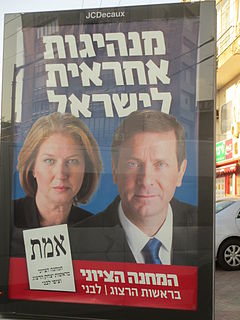|
Zionist Union
 The Zionist Union (Hebrew: הַמַחֲנֶה הַצִיּוֹנִי, translit. HaMaḥaneh HaẒiyoni, lit. the Zionist Camp) was a centre-left political alliance in Israel. It was established in December 2014 by the Israeli Labor Party and Hatnuah to create a joint electoral list to contest the 2015 elections with the hope of unseating Prime Minister Benjamin Netanyahu. It failed to do so but did come in second place with 24 seats in the Knesset, forming the official opposition. However, tension between the Union's competing factions resulted in its dissolution in early January 2019, ahead of that year's April election.[3] HistoryThe Labor Party and Hatnuah agreed on 10 December 2014 to form a joint ticket.[4] The list was established to create a large electoral list for the centre-left bloc, in the hope that it will lead the 34th government. Hatnuah leader Tzipi Livni has said that other parties will also be part of the alliance.[5] Livni and Labor leader Isaac Herzog initially said that if the alliance were to win enough seats to lead the next government, they would rotate in the post of Prime Minister, with Herzog serving for the first half of the Knesset's four-year term and Livni for the second half,[6] though Livni announced on 16 March 2015 that only Herzog would serve as prime minister.[7] Manuel Trajtenberg, number 11 on the list, was the list's candidate for finance minister. Amos Yadlin was the list's candidate for defense minister, though he was not a candidate for the Knesset.[8] The Green Movement also had representation on the list through the addition of Yael Cohen Paran, selected by Livni, on a spot (No. 25) reserved for Hatnuah members.[9] Composition
Ideology and platform Main issuesKey issues for the Zionist Union included the following:[10][11][12][13][14]
Other positionsIn addition, the Zionist Union is in favor of the following:
2015 electionList of Knesset membersThe following are the candidates elected to the 20th Knesset from the Zionist Union's party list.[20]
Election results
After the election, the Zionist Union emerged as the second-largest party in the Knesset, with 24 seats. It triumphed in Tel Aviv and its prosperous suburbs, as well as other liberal areas.[21][22] Its success was mostly in affluent areas, and it won the highest number of votes in 28 of Israel's 33 wealthiest communities.[23] References
External links
|
||||||||||||||||||||||||||||||||||||||||||||||||||||||||||||||||||||
